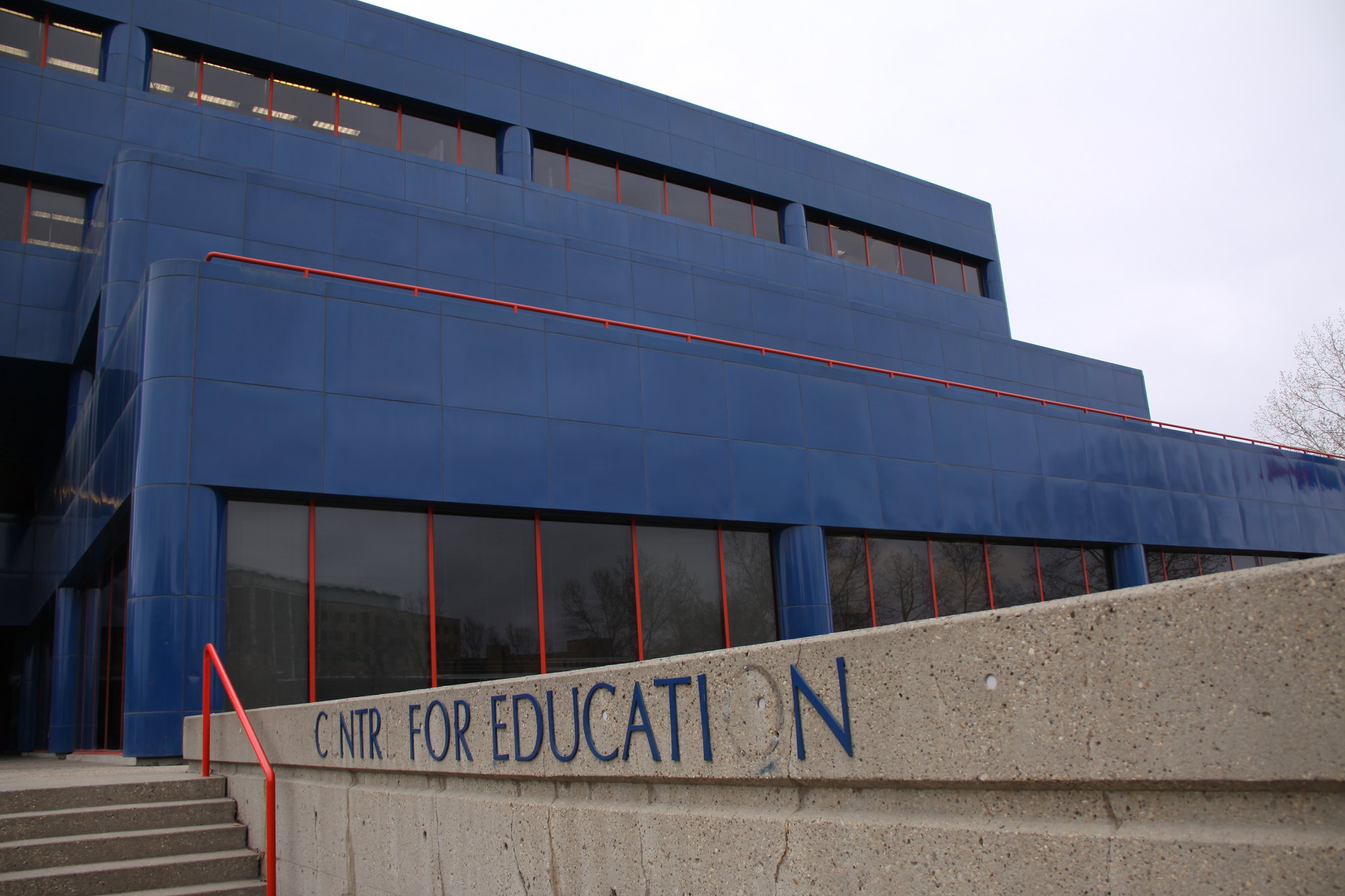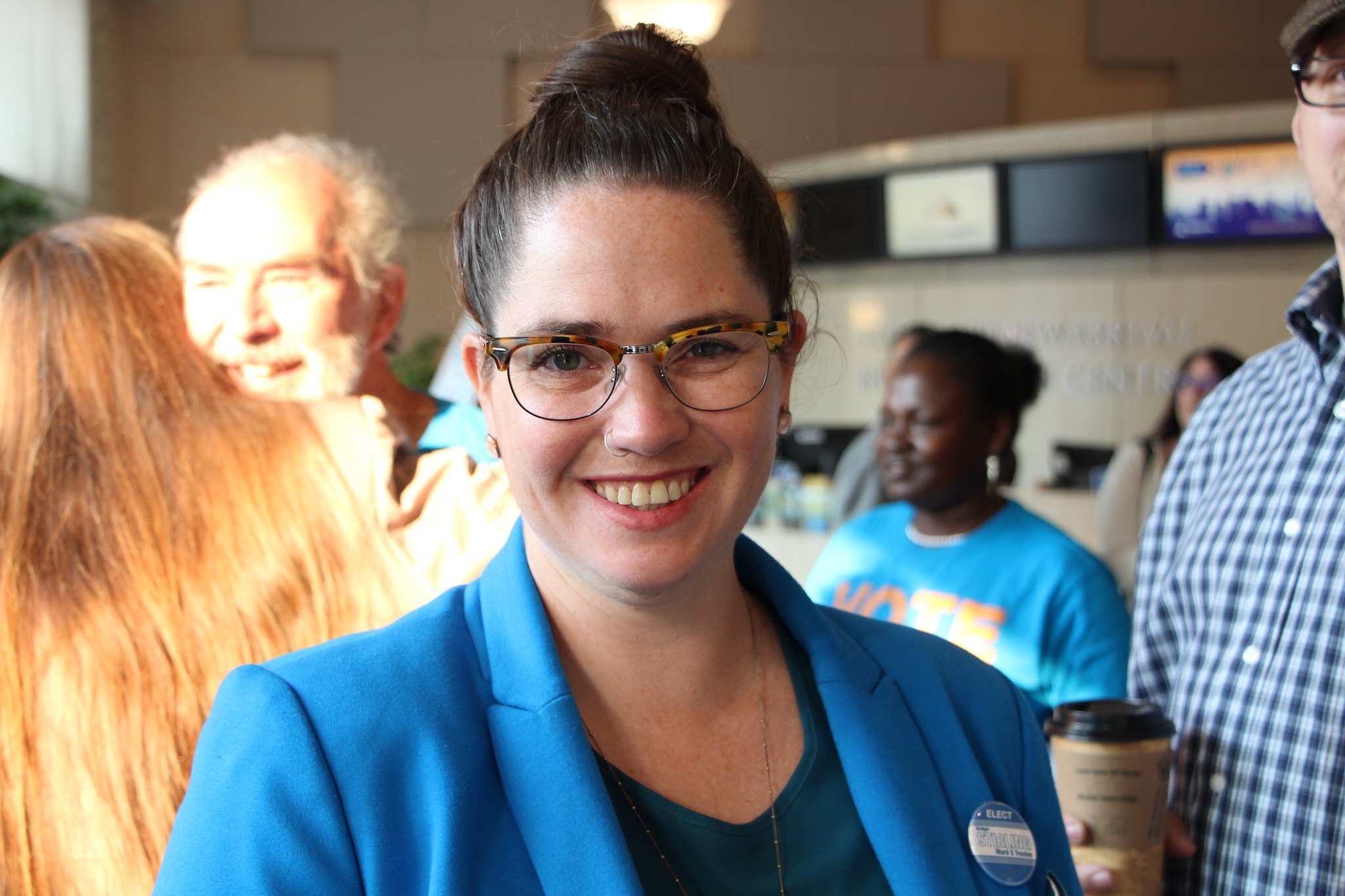
Ward G candidate Saadiq Sumar Photo: Hamdi Issawi
When it comes to elected school boards, who cares?
Trustee candidates don’t get much attention — but they should.
Support independent Calgary journalism!
Sign Me Up!The Sprawl connects Calgarians with their city through in-depth, curiosity-driven journalism. But we can't do it alone. If you value our work, support The Sprawl so we can keep digging into municipal issues in Calgary!
The evening after the federal election, Edmonton Public School Board candidate Saadiq Sumar is pounding pavement in Tamarack, on the eastern edge of Mill Woods, knocking on doors to win votes in Ward G—one of seven Edmonton races without an incumbent candidate.
Most residents receive his pitch with a polite smile before grabbing a pamphlet and shutting the door. But every now and then he gets a bite, and more often than not it’s a parent with a child in school.
“What’s a school board trustee?” one woman asks. She says her son goes to kindergarten at the neighbourhood school, but interjects before getting an answer. “I don’t have a long time to talk. Is it something to do with the schools? Are you managing them?”
Without missing a beat, Sumar compares the job to that of a city councillor—except trustees set policy for public schools in the district, and decide where to allocate funds.
“So if we have any concerns or anything, or I’m not happy about anything, you’re the guy to call?” the mother asks.
Aside from voter apathy, one of the problems with campaigning for a school board seat is that a lot of people, including those with school-aged children, don’t really know what it’s about.
“They don’t know what a trustee does,” Sumar says on his way to the next house. “They see a lot of what happens at school being driven by the school administration rather than an outside body."
That may explain why school board elections aren’t always top of mind for voters.
In Edmonton's 2017 election, voter turnout was 31.5%, and of nearly 195,000 people who cast a vote, almost 30,000 never bothered to choose a school trustee listed on the same ballot.
The election before that, more than 55,000 opted out of the school board vote.
While the province prepares to launch a controversial draft curriculum, and families navigate a return to classroom learning during a rising fourth wave that’s pushing the province’s health-care system to the brink of collapse, only two of the nine elected board members have elected to run again in Edmonton.
It’s not just that interest is low, it’s shockingly low.
Whatever voters decide, the next school board is going to have a lot of fresh faces making decisions on heavy files sure to ripple through the larger community.
A loss of interest
While the campaign trail offers anecdotal evidence, survey data from the Canadian Municipal Election Study suggests that many Albertans aren’t terribly interested in school board politics. On average, Calgarians in particular rated their interest at 3.9 out of 10.
They gave much higher ratings to municipal (6.8), provincial (7.4) and federal (7.6) politics.
University of Calgary political scientist Jack Lucas, who’s part of the study’s research team, says there’s no reason to believe the attitude in Edmonton is any different since survey results from several other cities are similar to those in Calgary.
“It’s not just that interest is low, it’s shockingly low. It’s low to a degree that you worry who’s even making the decision to elect these representatives in the first place,” Lucas said. “On what basis are they even electing these representatives, and to what extent can these representatives even claim to have any sort of democratic mandate from their community?”
It’s a problem that, coupled with the fact that several school board responsibilities have been chipped away and centralized over the years, fuels critics who oppose democratically elected school boards, he explains.
“The big question now is, if it's the province that makes decisions about large-scale collective bargaining on teacher salaries, on curricula, on tax rates or any number of other things, then why do we still have these elected bodies at the local level, and shouldn't this be sort of restructured?” Lucas added.
It’s already happening in other parts of the country.
In 2018, Nova Scotia dissolved democratically elected school boards and appointed a central advisory council in their stead. Manitoba was on track to do something similar until its government decided to nix a bill that would have replaced the provinces school boards with a provincial education authority appointed by the province.
Ontario has been consolidating and reducing the number of it’s school boards since the late-1960s, though Prince Edward Island and New Brunswick have gone back on decisions to dissolve their own.
You can also see the power of school boards in the curriculum battle.
“I think these days, people are much more aware that three, five or 10 years from now we may be looking at a very different kind of school administration system with the sort of slow demise of elected school boards,” Lucas said.
'A really powerful signal'
From her vantage point as an exiting Edmonton Public Schools trustee, Bridget Stirling says a democratically elected board plays an important role in its district, both as a publicly accountable body, and as advocate for the community.
“You can see where school boards matter from recent issues, like COVID safety in schools, where the province, initially going into the school year, had very little mandated for safety protocols in school,” Stirling said. “It was school divisions themselves that made the decision to go ahead and take action above and beyond the minimum to protect the lives and safety of students.”
Over the past term, the board has made several notable progressive moves, from supporting privacy for students in gay-straight alliances to creating inclusive dress codes, to advocating for evidence-based sexual health education. But with seven open wards, Stirling notes, the board could see a shift in direction, especially if social conservatives win those seats.
“You can also see the power of school boards in the curriculum battle, where the refusal of the vast majority fo school divisions in the province to pilot the curriculum sends a really powerful signal,” Stirling added.
The value of engagement
At another doorway in Tamarack, Sumar introduces himself to Dale Reimer, a potential voter who’s interested enough to carry on the conversation on the outside of the doorway.
“One of the biggest things I want to work on is the draft curriculum,” the candidate says. “It’s moving our students probably in the wrong direction, instead of moving them forward to think a little bit critically and think more for themselves.”
Why do we still have these elected bodies at the local level, and shouldn’t this be sort of restructured?
“Yes, please,” Reimer says with a chuckle.
But he’s also quick to admit that he hasn’t been paying attention to school board politics, and puts the problem (as he sees it) plainly: When his children were young, he tuned in. “But once they finished school, I quit paying attention,” Reimer says. “I’m a bit selfish, I guess you could say, but that’s the main reasoning behind it.”
Lucas, who specializes in municipal democracy and elections, confirms that parents with kids are more likely to vote in school board elections. And yet, a 2019 paper he co-authored that flags factors connected to turnout in trustee elections found that parents with children in public school were no more likely to participate than parents without kids in the district.
The research did, however, identify "information" as a contributing factor. The 2017 Students Count slate of candidates that ran for the Calgary Board of Education, for example, prompted conservative partisans to vote.
“They may have been more likely to vote because they had information that made their vote decision simpler,” the study notes, but “for opposition partisans, the partisan cue was less obvious—even if they knew that they did not want to vote for the Students Count candidate, it may have been unclear which other candidate they should support.”
For his part, Reimer believes the board could do a better job of engaging with constituents, specifically “more communication in terms of what their pains are and what’s going well.”
And even though the school board election doesn’t rank high on his list of priorities, he was willing to admit that it should, since all students passing through the system will form the next generation of citizens.
That’s a belief that Stirling firmly endorses for all voters in the upcoming election, regardless of whether or not they have children, and whether or not those children are in school.
“I think that all of us in society have a responsibility to care about what's happening with children into the next generation,” she said. “They’re our fellow citizens and what's going on in their education should matter to all of us."
Hamdi Issawi is a reporter and writer in Edmonton.
Support independent Calgary journalism!
Sign Me Up!The Sprawl connects Calgarians with their city through in-depth, curiosity-driven journalism. But we can't do it alone. If you value our work, support The Sprawl so we can keep digging into municipal issues in Calgary!






